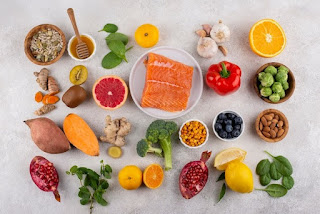The Power of Nutrition: Exploring Foods That Help Prevent Cancer
Nutrition plays a crucial role in cancer prevention, with research consistently highlighting the impact of diet on cancer risk. ‘According to the World Cancer Research Fund, an estimated 30-35% of cancer cases worldwide could be prevented through dietary and lifestyle changes.’ This statistic underscores the importance of understanding the power of nutrition in reducing cancer risk and promoting overall health.
This article delves into anti-cancer foods and supplements, exploring the evidence-backed benefits of incorporating these into your diet. From colorful fruits and vegetables to omega-3 fatty acids and vitamin D, we’ll uncover the essential nutrients and compounds that have been shown to help prevent cancer. Join us on this journey to harness the power of nutrition for a healthier, cancer-resistant future.
Let’s explore!
The role of nutrition in the fight against cancer cannot be overstated. Research has shown that certain foods contain compounds that have the potential to inhibit cancer growth, reduce inflammation, and boost the body’s natural defense mechanisms. By incorporating these anti-cancer foods and supplements into your diet, you can take proactive steps to support your overall health and reduce your risk of developing cancer.
Foods to Prevent Cancer
- Cruciferous Vegetables: Vegetables like broccoli, cauliflower, Brussels sprouts, and kale are rich in sulfur-containing compounds called glucosinolates, which have been shown to have anti-cancer properties. These vegetables also contain antioxidants and fiber, which can help protect against cancer and promote overall health.
- Berries: Berries such as blueberries, strawberries, raspberries, and blackberries are packed with antioxidants called polyphenols, which have been linked to a reduced risk of cancer. These colorful fruits also contain vitamins, minerals, and fiber, making them an excellent addition to any anti-cancer diet.
- Turmeric: Curcumin, the active compound in turmeric, has potent anti-inflammatory and antioxidant properties that may help prevent cancer. Studies have shown that curcumin can inhibit the growth of cancer cells and reduce the spread of tumors in animal models.
- Green Tea: Green tea contains catechins, a type of antioxidant that has been shown to have anti-cancer effects. Drinking green tea may help reduce the risk of certain types of cancer, including breast, prostate, and colorectal cancer.
- Garlic: Garlic contains sulfur compounds that have been shown to have anti-cancer properties. These compounds can inhibit the growth of cancer cells and promote apoptosis or programmed cell death, which is essential for preventing cancer.
Anti-Cancer Supplements:
- Omega-3 Fatty Acids: Omega-3 fatty acids, found in fatty fish like salmon, mackerel, and sardines, as well as in flaxseeds, chia seeds, and walnuts, have anti-inflammatory properties that may help reduce the risk of cancer.
- Vitamin D: Adequate vitamin D levels have been associated with a reduced risk of certain types of cancer, including breast, prostate, and colorectal cancer. Spending time outdoors and consuming vitamin D-rich foods like fatty fish, eggs, and fortified dairy products can help maintain optimal vitamin D levels.
- Probiotics: Probiotics are beneficial bacteria that can help support a healthy gut microbiome, essential for overall health and immune function. Some research suggests that probiotics may also play a role in reducing the risk of certain types of cancer, although more studies are needed to confirm these findings.
Summing Up
Incorporating anti-cancer foods and supplements into your diet is a proactive way to support your overall health and reduce your risk of developing cancer. By choosing a diet rich in fruits, vegetables, whole grains, and lean proteins and supplementing with essential nutrients like omega-3 fatty acids, vitamin D, and medicinal mushrooms, you can help protect yourself against this disease.




.jpg)
Comments
Post a Comment